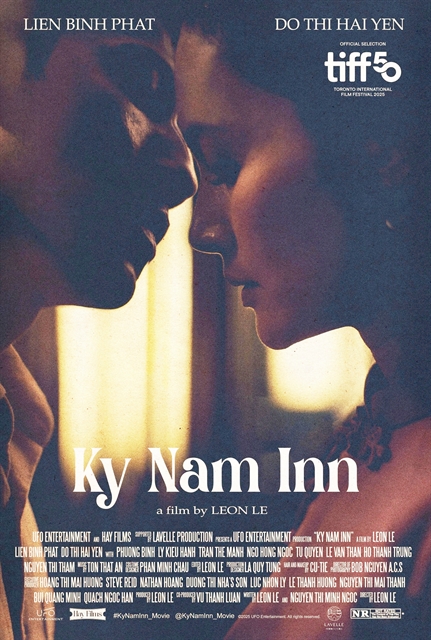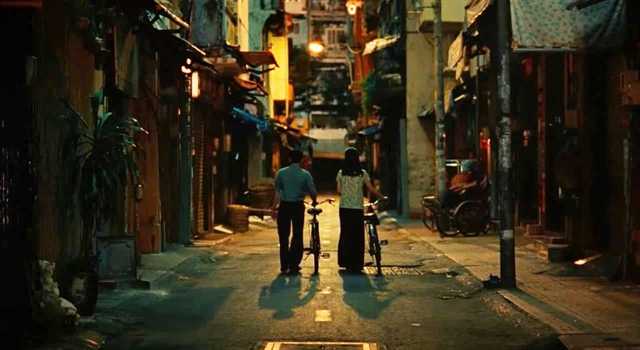 Life & Style
Life & Style

 |
| The official poster for Ky Nam Inn, released by the Toronto International Film Festival (TIFF). — Photo courtesy of TIFF |
HÀ NỘI — Following the critical success of Song Lang in 2018, Vietnamese-American director Leon Lê is back on the global cinema stage with his second feature film, Ky Nam Inn.
This time, the story unfolds against the backdrop of 1980s post-war Sài Gòn — its streets still heavy with history, yet trembling with transformation.
Premiering in the Special Presentations section at the 50th Toronto International Film Festival (TIFF) this September, Ky Nam Inn is one of a select few international films recognised for artistic merit. The section also features titles by Oscar veterans Guillermo del Toro and Baz Luhrmann, alongside Asian filmmakers like Yeon Sang-ho (Train to Busan) and Byun Sung-hyun (Kill Boksoon), cementing the festival’s status as a melting pot of global cinema.
At the heart of Ky Nam Inn is a story of quiet human connection. The film follows a young translator (played by rising star Liên Bỉnh Phát) who is working on Antoine de Saint-Exupéry’s The Little Prince. Lodging in a dilapidated collective housing unit, he encounters a widowed woman (played by Đỗ Hải Yến) navigating her own solitude. Together, across generations and emotional distances, they find solace in each other's presence — two souls gently colliding in the aftermath of war and loss.
Shot entirely on 35mm film, Ky Nam Inn makes a bold aesthetic choice in today’s digital age. This return to celluloid not only enriches the film's visual nostalgia, but also furthers Leon Lê’s signature of evoking the past with painterly intimacy. As seen in Song Lang, Leon Lê’s films often embrace the traditional visual language of Vietnamese cinema while introducing subtle, modern sensibilities.
 |
| A street scene in 1980s HCM City recreated in the film, featuring nostalgic urban details. — Screenshot courtesy Hay Films |
"I wanted this film to feel like Sài Gòn in the ‘80s — not just look like it,” Leon Lê said in a previous interview. To bring that vision to life, he reunited with long-time collaborators: screenwriter Nguyễn Thị Minh Ngọc, cinematographer Bob Nguyễn and composer Tôn Thất An. The same team behind Song Lang breathes quiet intensity and lyrical resonance into Ky Nam Inn, giving the film a seamless blend of emotion, culture and cinematic craft.
Perhaps one of the most anticipated elements of the film is the return of Đỗ Hải Yến, one of Vietnamese cinema’s most evocative actresses. This marks her first major role in eight years, following her acclaimed performances in films like Người Mỹ Trầm Lặng (The Quiet American), Cánh Đồng Bất Tận (The Floating Lives) and Chuyện Của Pao (Pao’s Story). Her role in Ky Nam Inn draws on her ability to convey silence, inner grief and emotional restraint — qualities that have long defined her acting style.
TIFF’s official synopsis praises Ky Nam Inn as “a tender and nuanced story of human connection”, highlighting its delicate storytelling and the compelling performances of its leads. While not in competition for prizes, the film’s inclusion in Special Presentations is itself a significant recognition — putting Vietnamese arthouse cinema back in the international conversation.
The film’s runtime of 140 minutes reflects its meditative pace. It doesn’t rush to deliver drama, but instead invites the viewer to sit quietly with the characters within the narrow alleyways of old Sài Gòn, inside forgotten corners of memory.
Despite international anticipation, Ky Nam Inn has not yet confirmed a Vietnamese theatrical release. However, with the TIFF premiere paving the way, audiences at home may expect to see the film by the end of the year or early next year.
As Vietnamese cinema continues to evolve, Ky Nam Inn offers a poignant reminder: sometimes, the most powerful stories are whispered, not shouted. And in the hands of Leon Lê, those whispers resonate far beyond borders. — VNS




